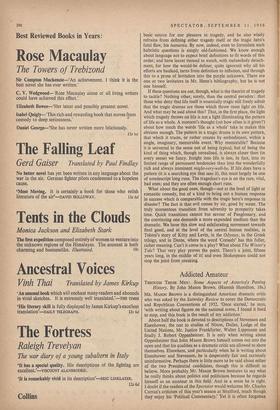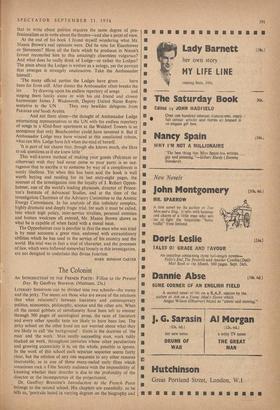Addicted Amateur
MR. MASON BROWN is a distinguished American dramatic critic who was asked by the Saturday Review to cover the Democratic and Republican Conventions of 1952. 'Once started,' he says, `with writing about figures on the national scene, I found it hard to stop, and this book is the result of my addiction.'
About half the book is devoted to descriptions of Stevenson and Eisenhower, the rest to studies of Nixon, Dulles, Lodge of the United Nations, Mr. Justice Frankfurter, Walter Lippmann and finally J. Robert Oppenheimer. It is only when writing about Oppenheimer that John Mason Brown himself comes out into the open and that his qualities as a dramatic critic are allowed to show themselves. Elsewhere, and particularly when he is writing about Eisenhower and Stevenson, he is desperately fair and curiously uninformative. Perhaps there is little more to be said about either of the two Presidential candidates, though this is difficult to believe. More probably Mr. Mason Brown hesitates to say what he really thinks about politics and politicians because he regards himself as an amateur in this field. And in a sense he is right. I doubt if the readers of the Spectator would welcome Mr. Charles Curran's criticism of this year's season at Stratford, much though they enjoy his 'Political Commentary.' Yet it is often forgotten
that to write about politics requires the same degree of pro- fessionalism as to write about the theatre—and also a point of view.
At the end of his book I found myself wondering what Mr. Mason Brown's real opinions were. Did he vote for Eisenhower or Stevenson? Have all the facts which he produces in Nixon's favour reconciled him to this amazingly charmless vulgarian? And what does he really think of Lodge—or rather the Lodges? The piece about the Lodges is written as a eulogy, yet the portrait that emerges is strangely unattractive. Take the Ambassador himself : 'The many official parties the Lodges have given . . . have been far from stiff. After dinner the Ambassador often breaks the
ice . by drawing upon his endless repertory of songs and singing them lustily alone or with his old friend and closest harmonizer James J. Wadsworth, Deputy United States Repre-
sentative to the UN They may bewilder delegates from Pakistan and Saudi Arabia.
. . . And not them alone—the thought of Ambassador Lodge entertaining representatives to the UN with his endless repertory of songs in a 42nd-floor apartment at the Waldorf Towers is so monstrous that only Beachcomber could have invented it. But if Ambassador Lodge may have winced at this unsolicited tribute, what can Mrs. Lodge have felt when she read of herself .
'It is part of her charm that, though she knows much, she likes to ask questions as if she knew little' This well-known method of making your guests (Pakistani or otherwise) wish they had never come to your party is so out- rageous that to ascribe it to someone by way of a compliment is surely libellous. Yet when this has been said the book is well worth buying and reading for its last sixty-eight pages, the account of the investigation into the loyalty of J. Robert Oppen- heimer, one of the world's leading physicists, director of Prince- ton's Institute of Advanced Studies, and at the time of the investigation Chairman of the Advisory Committee to the Atomic Energy Commission. In his analysis of this infinitely complex, highly dramatic and deeply tragic trial, for such it must be called, into which high policy, inter-service rivalists, personal enmities and human weakness all entered, Mr. Mason Brown shows us what he is capable of when faced with a moral issue.
The Oppenheimer case is peculiar in that.the man who was tried is by most accounts a great man, endowed with extraordinary abilities which he has used in the service of his country and the world His trial was in fact a trial of character, and the processes of law, which were followed somewhat loosely in this investigation, are not designed to undertake this divine function.
MARK BONHAM CARTER



































 Previous page
Previous page